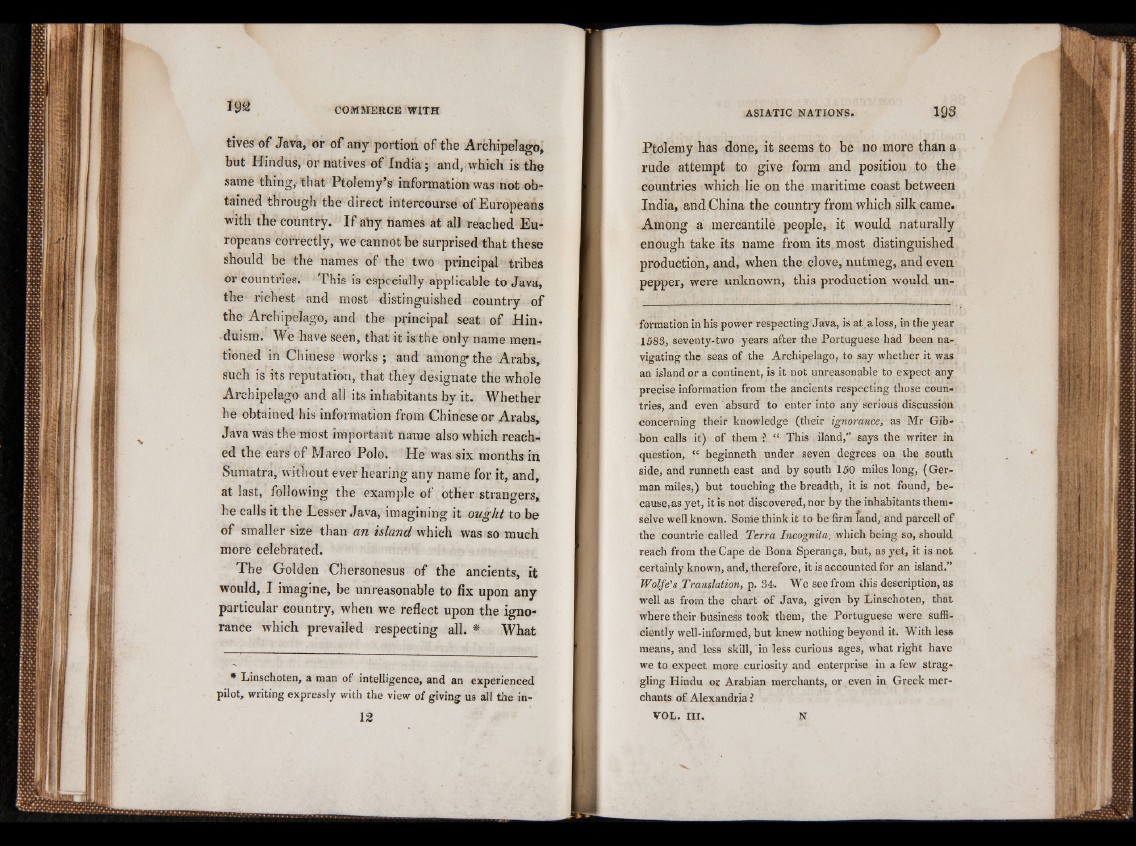
tives of Java, or of any portion of the Archipelago,
but Hindus, or natives of India; and, which is the
same thing, that Ptolemy’s information was not obtained
through the direct intercourse of Europeans
with the country. If ahy names at all reached Europeans
correctly, we cannot be surprised that these
should be the names of the two principal tribes
or countries. This is especially applicable to Java,
the richest and most distinguished country of
the Archipelago, and the principal seat of H induism.
We have seen, that it is the only name mentioned
in Chinese works ; and among the Arabs,
such is its reputation, that they designate the whole
Archipelago and all its inhabitants by it. Whether
he obtained his information from Chinese or Arabs,
Java was the most important name also which reached
the ears of Marco Polo. He was six months in
Sumatra, without ever hearing any name for it, and,
at last, following the example * of other stranCg ers*. he calls it the Lesser Java, imagining it ought to be
of smaller size than an island which was so much
more celebrated.
The Golden Chersonesus of the ancients, it
would, I imagine, be unreasonable to fix upon any
particular country, when we reflect upon the ignorance
which prevailed respecting all. * What
* Linschoten, a man of intelligence, and an experienced
pilot, writing expressly with the view of giving us all the in-
12
Ptolemy has done, it seems to be no more than a
rude attempt to give form and position to the
countries which lie on the maritime coast between
India, and China the country from which silk came.
Among a mercantile people, it would naturally
enough take its name from its. most distinguished
production, and, when the clove, nutmeg, and even
pepper, were unknown, this production would unformation
in his power respecting Java, is at a loss, in the year
1583, seventy-two years after the Portuguese had been navigating
the seas of the Archipelago, to say whether it was
an island or a continent, is it not unreasonable to expect any
precise information from the ancients respecting those countries,
and even absurd to enter into any serious discussion
concerning their knowledge (their ignorance¡, as Mr Gibbon
calls it) of them 1 “ This iland,” says the writer in
question, fl beginneth under seven degrees on the south
side, and runneth east and by south 150 miles long, (German
miles,) but touching the breadth, it is not found, because,
as yet, it is not discovered, nor by the inhabitants them*
selve well known. Some think it to be firm land, and parcell of
the countrie called Terra Incognita, which being so, should
reach from the Cape de Bona Speranga, but, as yet, it is not
certainly known, and, therefore, it is accounted for an island.”
Wolfe's Translation, p. 34. We see from this description, as
well as from the chart of Java, given by Linschoten, that
where their business took them, the Portuguese were sufficiently
well-informed, but knew nothing beyond it. With less
means, and less skill, in less curious ages, what right have
we to expect more curiosity and enterprise in a few straggling
Hindu or Arabian merchants, or even in Greek merchants
of Alexandria 1